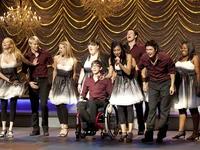
7 minute read
PARTS OF SPEECH
KURT HUMMEL
Portrayed By: CHRIS COLFER
Advertisement
PARTS OF SPEECH
PARTS OF SPEECH NOUNS
Types of nouns:
· Common Nouns: name a class of people, places, things, or ideas. Bathroom, Garage, School, House · Proper Nouns: give the name or title of a particular person, place,
thing, or idea (must be capitalized).
McKinley High School, New York, Naya Rivera, NYADA · Compound Nouns: consist of words used together to form a
single noun.
Cabinet, Ipad, Door, Wall · Concrete Nouns: refer to material things, to people, or to places. Couch, Bed, Pencil, Phone · Abstract Nouns: name ideas, qualities, concepts, emotions, or
attitudes.
Imagination, Intelligence, Creativity, Pain
Functions (How nouns are used):
· Subject (comes before the verb) Santana yelled at her friend after betraying her. · Direct Object (comes after the verb and answers what or whom) Puck asked Rachel for help on his History homework. · Indirect Object (answers to who or to whom) Carole gave her son Finn a new phone.

SANTANA LOPEZ

Portrayed By: NAYA RIVERA
PRONOUNS
Pronouns take the place of nouns that have been established.
Personal:
Nominative (subjects) Objective (objects)
I/we me/us you/you you/you
He, she, it, one/they him, her, it, one/them
Possessive
My, mine
our, ours Your, yours your, yours His, her, hers, its, one’s their, theirs
Relative:
Nominative who
That Objective whom that those/ this Possessive whose of that
Interrogative:
who, which, what, whatever, whoever
Reflexive: (personal pronouns plus the suffix –self or –selves)
Used only: when the action verb is directed toward the subject of the construction: He has no confidence in himself He relies on himself only
to intensify a point: The student herself had a very difficult time doing the project but when she presented it she was proud of herself.
Demonstrative:
this, these that, those
Indefinite:
all, another, anybody, anyone, anything, both, each, either, everybody, everyone, everything, everywhere, few, many, much, neither, nobody, none, no one, nothing, one, other, several, somebody, someone, such.
SAM EVANS

Portrayed By: CHORD OVERSTREET
VERBS
Verbs show the time, action, and state of being of a subject.
Tense: verbs indicate time via tenses:
simple past past past perfect past progressive simple present present present perfect present progressive present perfect progressive future future perfect
Types: There are at least eleven (11) types of verbs: auxiliary verbs (helping verbs) linking verbs (verbs that do not describe action, but connect the subject of a sentence to other parts of the sentence – usually the predicate) lexical verbs (main verbs) dynamic verbs (indicate action) stative verbs (describe a condition) finitive verbs (indicate tense) nonfinitive verbs (infinitives or participles) regular verbs (weak verbs) irregular verbs (strong verbs) transitive verbs (verbs followed by a direct object) intransitive verbs (verbs that do not take direct objects)
Voice: Voice is the form of the verb that indicates how it relates or interacts with the action. The English language has two voices: ACTIVE and PASSIVE. Active: The family opened their gifts on Christmas. Passive: The gifts were opened by the family on Christmas.
Verbals: (VERB FORMS NOT USED AS VERBS)
Gerund: word ending in “ing” used as a noun. · Brittany really enjoys investigating unsolved cases. Participle: word ending in “ing” or “ed” used as an adjective · There is no running track at the park. · Quinn walked by the abandoned mall. Infinitive: verb preceded by the word “to” (to go, to jump) used as nouns, adjectives, or adverbs
· Sam goes to play football afterschool.
QUINN FABRAY

Portrayed By: DIANNA AGRON
ADJECTIVES
Adjectives modify, describe, limit, and identify nouns and pronouns. · Kinds: Demonstrative, Common, Proper (Give one example of each using words related to your subject) This is Tina's favorite book. Artie is a very smart guy. Santana is a Mexican student.
ADVERBS
Adverbs modify verbs, adjectives, and other adverbs. · Endings (Create one example related to your subject for each) Santana can not rely on Rachel Kurt came towards Blaine to confront him Mercedes liked Sam otherwise she would have hurt him. · Conversions (Show how three words related to your subject can become adverbs – Example: “Educational” becomes “Educationally”) Blaine is physically inactive. Unique is transitionally becoming who she wants. Marley by miracle survived. · Types:
Manner, Frequency, Degree, Place, Time
Example Types: (Create one example each related to your subject) Manner – Carole politely asked Finn to clean up his room. Time – Like always Kitty arrived late. Place – Coach Sylvester arrived at the choir room at the wrong time. Degree – No one believed MIT wanted Brittany. Frequency – Santana always said what was on her mind.

BLAINE ANDERSON

Portrayed By: DARREN CRISS
CONJUNCTIONS
Coordinating (FANBOYS): for, and, nor, but, or, yet, so Correlative: Either/or; neither/nor; not only/but also; both/and; whether/or; as/so
Subordinate: after, though as, as if, as long as, as thought, because, before, if, in order that, provided that, since, so, so that, that, though, till, unless, when, where, whereas, while
Relative pronouns: who (refers to people), which (refers to non living object or animals), that (may refer to animals or nonliving objects)
PREPOSITIONS
Prepositions link nouns, pronouns, and phrases to other parts of the sentence. Prepositions are NEVER followed by verbs. There are one-word prepositions and complex prepositions. These are some common one-word prepositions: aboard, about, above, according to, across, across from, after, against, along, alongside, alongside of, along with, amid, among, apart from, around, as, as far as, aside from, at, away from, back of, because of, before, behind, below, beneath, beside, between, beyond, but (except), by, by means of, concerning, despite, down, down from, except, except excluding for, for, from, from among, from between, from under, in, in addition to, in behalf of, including, in front of, in place of, in regard to, inside, inside of, in spite of, instead of, into, like, near, near to, notwithstanding, of, off, on, on account of, on behalf of, onto, on top of, opposite, out, out of, outside, outside of, over, over to, owing to, past, prior to, to, toward, under, underneath, until, unto, up, upon, up to, versus, with, within, without.

BRITTANY S PIERCE

Portrayed By: HEATHER MORRIS
INTERJECTIONS
Interjections are the final part of speech. Find and copy/paste an alphabetical list of interjections here. A: aah, ack, aha B: blast, boy, brother C: cheerio, cheers, curses D: doggone, duh, drat E: exactly, egads, eek F: fie, fooey, foo G: gulp, gosh, good H: hurray, hey, how I: ick, ixnay, is it J: jeez, just kidding, just a sec K: kapish L: lordy, look, lo M: meh, men, my N: nah, naw, never O: over, okay, oof P: peace, pew, psst Q: quite R: rumble, right, roger S: say, sorry, snap T: thanks, there, toodles U: ugh, um, urgh V: vroom, voila, very well W: what, when, word Y: yikes, yeah, yummy Z: zap, zowie, zounds

ARTIE ABRAMS

Portrayed By: KEVIN MCHALE
Addition
Comparison
Contrast Transitions of Logic Chart
Milder
a further and and then then also too next another other nor further furthermore moreover in addition additionally besides again equally important first, second finally, last
just as ... so too a similar another... like similarly comparable in the same way likewise
but yet and yet still otherwise or though but another rather however still nevertheless on the other hand on the contrary even so notwithstanding for all that in contrast alternatively at the same time though this may be otherwise instead nonetheless conversely
Stronger
Time
Purpose
Place
Result
then now soon afterward later shortly earlier recently first, second, third next before after today tomorrow meanwhile at length presently at last finally immediately thereafter at that time subsequently eventually currently in the meantime in the past in the future
to do this so that to this end with this object for this purpose for that reason because of this in order to
there here beyond nearby next to at that point opposite to adjacent to on the other side in the front in the back
so and so then hence therefore accordingly consequently thus thereupon as a result in consequence
Example
Summary and Emphasis
that is specifically in particular for one thing for example for instance an instance of this this can be seen in
in sum generally after all by the way in general incidentally naturally I hope at least it seems in brief I suppose in short on the whole as I said in other words to be sure in fact indeed clearly of course anyway remarkably I think assuredly definitely without doubt for all that on the whole in any event importantly certainly





